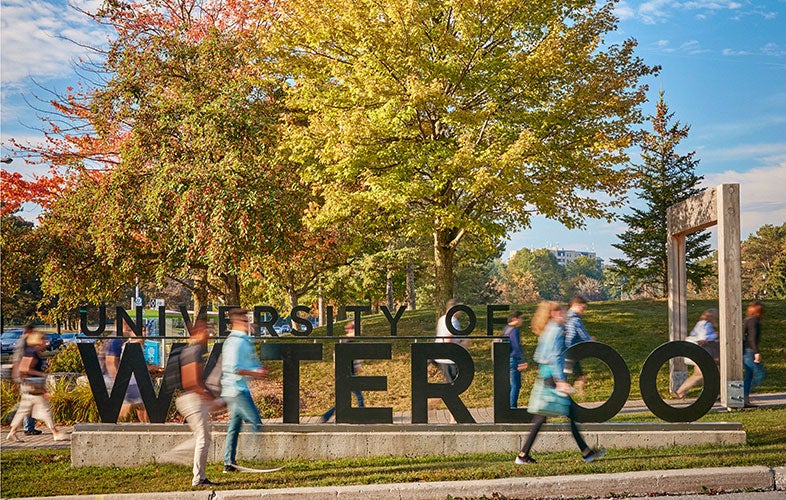Quick Links

Waterloo’s six Faculties are vital partners to achievement in all areas of our Strategic Plan. Strategic Plan initiatives have supported Faculty leadership, particularly in the areas of Transformational Research and Outstanding Academic Programming.
Funding for Strategic Projects
Waterloo’s Faculties reported tremendous success in accessing funding in strategic areas in 2016/17. University-wide efforts facilitated Faculty access to resources that support research. Some of these are outlined below.
- Waterloo research projects have real world impacts. Some of these include:
- leading one of the world’s largest and most comprehensive longitudinal studies of youth to reduce the future cancer burden in Canada using policies and programs;
- creating tools for risk screening, care coordination, and patient engagement in decision-making, and implementing a standardized comprehensive geriatric assessment instrument in 10 Canadian hospitals;
- responding to the Truth and Reconciliation Commission in partnership with the Waterloo Aboriginal Education Centre and Indigenous partners to raise awareness through The Mush Hole Project;
- building a new facility for automotive research and testing;
- expanding the Multi-Scale Additive Manufacturing Lab, to build new techniques and approaches for automotive and manufacturing processes;
- approved testing for Autonomoose autonomous vehicle platform on all public roads in Ontario;
- developing new, sustainable strategies for managing hazardous mine waste; and
- exploring how bacteriophages can combat colon cancer.
- Waterloo researchers also advanced international research activities to address critical multinational issues including developing public health informatics and institutional capacity for linking climate change and health, building data repositories for polar regions, the study of groundwater pollution in arid regions, and management of agriculture pollutants.
- Three Waterloo researchers were named as fellows to the prestigious Royal Society of Canada: Professors Colin MacLeod (Arts), Jennifer Clapp (Environment), and Tamer Özsu (Math). Another three were named as members of the Royal Society of Canada, College of New Scholars, Artists and Scientists: Professors John Turri (Arts) and Zhongwei Chen and John Yeow (Engineering).
New Courses and Programs
In 2016/17, Waterloo’s Faculties continued to contribute to outstanding academic programming. Some examples of these academic programming successes are highlighted here.
- Arts teaching staff are implementing efforts to build English language competency skills across the Faculties of Engineering, Math, Science and Environment.
- New undergraduate and graduate courses and programs developed in 2016/17 included a new course-based master’s program in Recreation and Leisure Studies, a new course in Applied Health Sciences (AHS) for non-AHS students, a new minor in Urban Studies in Environment, two first-year Arts courses in Inquiring and Communication and Information and Analysis, and an online graduate diploma in Climate Risk Management. Senate approved a new undergraduate program in Data Science incorporating computer science and statistics.
- Waterloo's Faculty of Math partnered with international institutions on a new dual degree doctoral program agreement with the Chinese Academy of Sciences, as well as a pan-African network of centres of excellence for postgraduate training, research, and engagement in mathematical sciences.
- Several Faculties continued to improve online learning opportunities through the development of STEM-aware (sciences, technology, engineering, and math) course development platforms, integration of more interactive learning technology into online courses, and the use of augmented online testing and evaluation software.
Beyond the Classroom
Faculties make important contributions to other areas of the strategic plan. These efforts enrich the University as a whole, and especially, student experiences. Some of these initiatives and activities are described here.
- New and renovated spaces in several Faculties enhance students’ campus experience including the AHS Expansion Building, Toby Jenkins Applied Health Research building, and the Faculty of Arts’ Hagey Hall Hub.
- All Faculties host or support entrepreneurial initiatives for students. This includes AHS’s Hack4Health 2.0 hosted by the Murray Alzheimer Research and Education Program, Arts’ stART up which provides education and mentorship opportunities, and several funds in Engineering to support Capstone Design competitions and student ventures.
- Several Science and Engineering students won numerous external entrepreneurial competitions with their ventures, including Suncayr, Medella Health, Arylla, and Penta Medical.
- Waterloo students across all Faculties participated in a range of experiential and international experiences. In Arts, the number of undergraduate students participating in international exchanges has doubled since 2012/13. Five students from four different Faculties (Arts, Engineering, Environment, and Science) participated in the Waterloo delegation at COP22, Conference of Parties to the United Nations Framework Convention on Climate Change.
- International competitions offer opportunities for students to engage in problem solving in high pressure situations:
- Waterloo’s NanoRobotics Group captured first place at the Mobile Microrobotics Challenge at the International Conference for Robotics and Automation;
- Applied Health Science, Arts, and Science students won the 2017 Hult Prize Regionals in London England; and
- Math students finished sixth out of 568 institutions at the Putnam competition and 13th in the Association for Computing Machinery International Collegiate Programming Contest.
- Creating a better environment for students means tackling difficult issues. The Faculty of Arts hosted a number of initiatives to help students and others develop critical awareness and action to end sexual assault and harassment on campus and beyond.